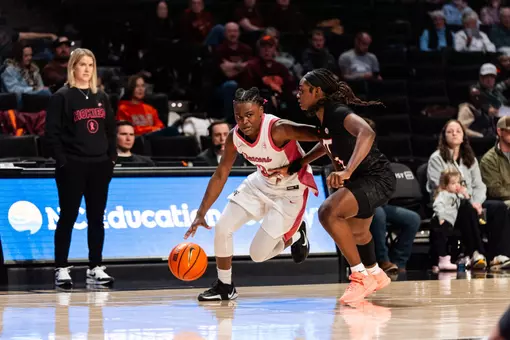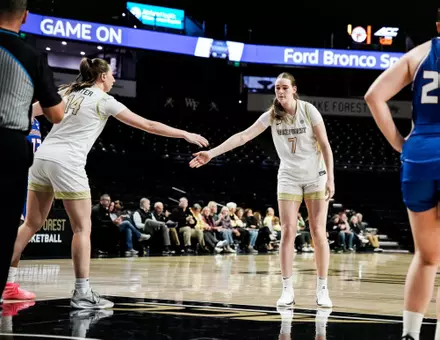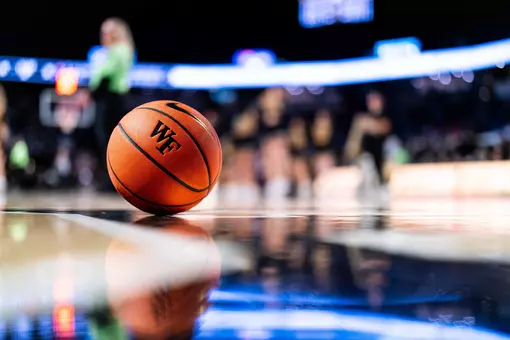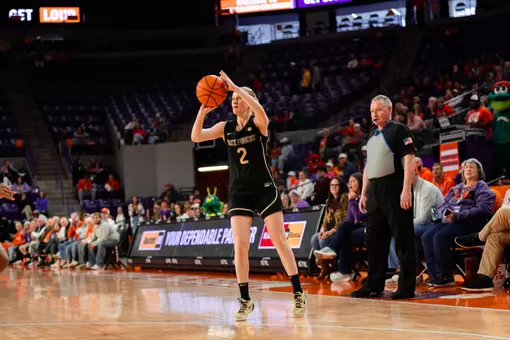Wake Forest Athletics
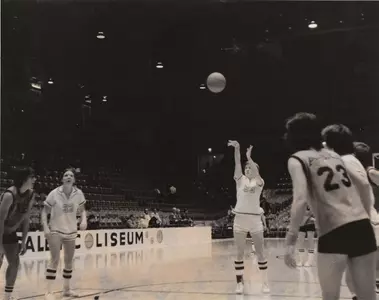
In Her Wake: Halverson was a Leader and Pioneer in Wake Forest Athletics
2/11/2024 9:56:00 AM | Women's Basketball
“I've always been proud to be a Wake Forest grad and to have been a college athlete.” - Roper Halverson
While coach Randi Smart certainly has the Wake Forest Volleyball team trending in the right direction, knocking on the door of an NCAA Tournament bid, it's the 1975 squad that owns the program record for most wins with 31.
Wake Forest Sports Hall of Fame member Roper Halverson was a member of that team that made a deep postseason run in just its fifth year of existence.
"We won the state title, which sent us to regionals," Halverson said. "We swept the regionals. We lost one game in the regionals, and we were awarded a bid to the Small College National Volleyball Tournament in Pocatello, Idaho.
"We got hammered there because West Coast rules were different from East Coast rules. But we still hold the record for most wins in Wake Forest Volleyball history."
A R.J. Reynolds High School (Winston-Salem, N.C.) graduate who also attended Mount Tabor, Halverson applied to Wake Forest because of a suggestion from her father.
"We couldn't afford for me to live on campus, so I decided Wake Forest didn't have a women's golf team, and I was going to start a women's golf team," Halverson said. "That's why I went to Wake Forest."
She became a three-sport star when she arrived at Wake Forest in 1972, playing volleyball, basketball and golf.
"So when I got there and talked to Marge Crisp who was the golf coach," Halverson recalls. "There was one lady who wanted to play golf. Her name was Debbie Rhodes. Marge and Debbie went to two or three tournaments in 1971."
After telling Crisp that Wake Forest needed a women's golf team, Halverson took it upon herself to recruit some players.
"We fielded a team of five or six, and we had fall golf and spring golf. So it was really two separate seasons," she said. "The men have always played at Old Town. We weren't allowed to play at Old Town, so we could practice at Grandview after all of the members finished plans. So we couldn't get access to the course until after four o'clock.
"And you couldn't walk to Grandview from campus. So if you didn't have cars, you couldn't get to the course, and depending on when your labs ended or whatever else you had going on — it was just a cluster. But that led me to Wake Forest, and that kind of fueled the golf team. We spent quite a bit of time at Appalachian State and at Furman, we'd go down for a weekend tournament and spend the night in one of their big rooms that had double beds in it. We didn't have money, so we didn't stay in hotel rooms In those early days. The programs weren't exactly funded to the extent they are these days."
Playing three sports certainly stretched Halverson's time, especially when you consider the rigorous academic standards at Wake Forest.
"Well, the good thing about your diploma is it doesn't have your GPA on it," she joked. "So we usually practiced every night from 7-9 p.m. because we couldn't get access to the gym until all the intramurals were over."
With Wake Forest celebrating 50 years of women's intercollegiate athletics last year, Halverson can't help but recognize how different the conditions are now for student-athletes than during her time as a Demon Deacon.
"When we toured the new men's and women's basketball facilities last fall, and they are exactly alike, my heart, I just wanted to have a big old cry right there," she said. "(Former Wake Forest women's basketball coach) Nora Lynn Finch got one roll of tape per week. I got a key to the training room my junior year because they were recruiting my brother for football.
"It didn't keep any of us from wanting to do something that we loved, and that was to play ball — whether it was tennis or basketball or volleyball. We didn't have professor support. The mantra was just let them do it for a while and then they'll figure out they don't have the stamina for this."
Halverson was a team captain and all-state basketball and volleyball player for the Demon Deacons, averaging 15.8 points and 12.3 rebounds a game as a junior and 18.8 points and 7.9 boards in her final campaign.
"I've always been proud to be a Wake Forest grad and to have been a college athlete — I would not change any of what we went through," she said. "Even when I look back and say, well, it would've been nice if we'd had a scholarship and saved mom and dad some money, but I don't even lose sleep over that. Our own practice uniforms, we had one water bottle. I mean, we figured out how to make it work. We weren't allowed to use a university van until my junior year. We had to drive our own cars to games.
"So when I see just the quick acceleration of athletics at Wake Forest shows me what many of us have known for a long time. Now we're bringing home field hockey national titles and a golf national title. I'm proud of the investment on behalf of (Bob) McCreary, (Mit) Shaw and (Ben) Sutton and all these folks who are investing back into the university for future athletics and athletes. But there's more to Wake Forest than athletics — it's a family affair."
She became the first female athletic trainer at Wake Forest in 1977, and served as an assistant coach for both basketball and volleyball before beginning her more than three-decade long career in the medical field.
"Academics are extremely important," Halverson said. "And I think the mantra of the university is that when you graduate, we have prepared you for your next journey. So my involvement in athletics at Wake Forest prepared me for my lifetime job of being a nurse and a leader. I go back to my days at Wake Forest and athletics that laid a good foundation from an athletic perspective, but it laid an even better foundation that fueled me into my profession."
Wake Forest Sports Hall of Fame member Roper Halverson was a member of that team that made a deep postseason run in just its fifth year of existence.
"We won the state title, which sent us to regionals," Halverson said. "We swept the regionals. We lost one game in the regionals, and we were awarded a bid to the Small College National Volleyball Tournament in Pocatello, Idaho.
"We got hammered there because West Coast rules were different from East Coast rules. But we still hold the record for most wins in Wake Forest Volleyball history."
A R.J. Reynolds High School (Winston-Salem, N.C.) graduate who also attended Mount Tabor, Halverson applied to Wake Forest because of a suggestion from her father.
"We couldn't afford for me to live on campus, so I decided Wake Forest didn't have a women's golf team, and I was going to start a women's golf team," Halverson said. "That's why I went to Wake Forest."
She became a three-sport star when she arrived at Wake Forest in 1972, playing volleyball, basketball and golf.
"So when I got there and talked to Marge Crisp who was the golf coach," Halverson recalls. "There was one lady who wanted to play golf. Her name was Debbie Rhodes. Marge and Debbie went to two or three tournaments in 1971."
After telling Crisp that Wake Forest needed a women's golf team, Halverson took it upon herself to recruit some players.
"We fielded a team of five or six, and we had fall golf and spring golf. So it was really two separate seasons," she said. "The men have always played at Old Town. We weren't allowed to play at Old Town, so we could practice at Grandview after all of the members finished plans. So we couldn't get access to the course until after four o'clock.
"And you couldn't walk to Grandview from campus. So if you didn't have cars, you couldn't get to the course, and depending on when your labs ended or whatever else you had going on — it was just a cluster. But that led me to Wake Forest, and that kind of fueled the golf team. We spent quite a bit of time at Appalachian State and at Furman, we'd go down for a weekend tournament and spend the night in one of their big rooms that had double beds in it. We didn't have money, so we didn't stay in hotel rooms In those early days. The programs weren't exactly funded to the extent they are these days."
Playing three sports certainly stretched Halverson's time, especially when you consider the rigorous academic standards at Wake Forest.
"Well, the good thing about your diploma is it doesn't have your GPA on it," she joked. "So we usually practiced every night from 7-9 p.m. because we couldn't get access to the gym until all the intramurals were over."
With Wake Forest celebrating 50 years of women's intercollegiate athletics last year, Halverson can't help but recognize how different the conditions are now for student-athletes than during her time as a Demon Deacon.
"When we toured the new men's and women's basketball facilities last fall, and they are exactly alike, my heart, I just wanted to have a big old cry right there," she said. "(Former Wake Forest women's basketball coach) Nora Lynn Finch got one roll of tape per week. I got a key to the training room my junior year because they were recruiting my brother for football.
"It didn't keep any of us from wanting to do something that we loved, and that was to play ball — whether it was tennis or basketball or volleyball. We didn't have professor support. The mantra was just let them do it for a while and then they'll figure out they don't have the stamina for this."
Halverson was a team captain and all-state basketball and volleyball player for the Demon Deacons, averaging 15.8 points and 12.3 rebounds a game as a junior and 18.8 points and 7.9 boards in her final campaign.
"I've always been proud to be a Wake Forest grad and to have been a college athlete — I would not change any of what we went through," she said. "Even when I look back and say, well, it would've been nice if we'd had a scholarship and saved mom and dad some money, but I don't even lose sleep over that. Our own practice uniforms, we had one water bottle. I mean, we figured out how to make it work. We weren't allowed to use a university van until my junior year. We had to drive our own cars to games.
"So when I see just the quick acceleration of athletics at Wake Forest shows me what many of us have known for a long time. Now we're bringing home field hockey national titles and a golf national title. I'm proud of the investment on behalf of (Bob) McCreary, (Mit) Shaw and (Ben) Sutton and all these folks who are investing back into the university for future athletics and athletes. But there's more to Wake Forest than athletics — it's a family affair."
She became the first female athletic trainer at Wake Forest in 1977, and served as an assistant coach for both basketball and volleyball before beginning her more than three-decade long career in the medical field.
"Academics are extremely important," Halverson said. "And I think the mantra of the university is that when you graduate, we have prepared you for your next journey. So my involvement in athletics at Wake Forest prepared me for my lifetime job of being a nurse and a leader. I go back to my days at Wake Forest and athletics that laid a good foundation from an athletic perspective, but it laid an even better foundation that fueled me into my profession."
Steve Forbes - Postgame Presser at Duke
Saturday, January 24
Steve Forbes - Postgame Presser vs. SMU
Wednesday, January 21
Men's Basketball All-Access at Florida State
Monday, January 19
Steve Forbes - Postgame Presser at Florida State
Sunday, January 18
